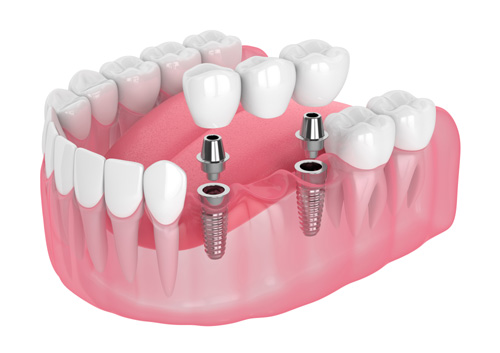Being in the market for an implant is not as straightforward as one may think. Depending on your circumstances, there are often a variety of options to choose from when it comes to finding the perfect tooth replacement for your specific mouth. When you are looking for a natural and comfortable replacement for missing teeth, an implant-supported bridge may come up. Unlike a traditional dental bridge, which relies on adjacent teeth for support, an implant-supported bridge is anchored directly into the jawbone.
An implant-supported bridge is a form of tooth replacement for those who are missing at least two neighboring teeth. Two implants will be placed directly into the jawbone. After this area has healed and abutments have been placed to directly connect the posts to the crowns, the crowns will be anchored in place. When you are considering a dental implant, it is imperative you consult a dedicated oral surgeon like one from Union City Oral Surgery Group prior to making any big decisions. We can help you review the pros and cons, and we will also devise a treatment plan catered to you.
Advantages of an Implant-Supported Bridge
When compared to the plethora of other options available for tooth replacements, the implant-supported bridge offers many unique advantages over traditional bridges. For starters, it does not require the usage of natural teeth. Instead, by using dental implants, the patient can receive their bridge without the usage of their natural teeth. Implant-supported dental bridges do not require the usage of natural teeth, which often have to be heavily shaved down in traditional bridges, making them a more conservative option.
With natural tooth bridges, the natural teeth often have to be heavily shaved down, which is not necessary when you use implants and crowns. Once the implants have been placed and healed, the patient can fully expect to have a long-lasting and natural-looking addition to their mouth. Implant-supported bridges, if taken care of properly, can be permanent fixtures and can help fully restore the look, feel, and function of the missing teeth.
Who Makes a Good Candidate for Dental Implants and an Implant-Supported Bridge?
When you have your initial consultation with an oral surgeon at Union City Oral Surgery Group, they will conduct a full examination of your mouth. Depending on how you lost your missing teeth, you may need additional surgical procedures before you are a good candidate for the implant process. For example, if you had to have your teeth extracted due to a gum disease, like periodontitis, your oral surgeon may schedule you for a series of restorative visits. This would allow for your gum disease to heal and for your gums and jawbone to be healthy and sturdy enough to fully support the post of the dental implant.
Good candidates must have a jawbone healthy enough to take the stress of the post of the implant, as well as not have any active gum diseases or other oral health issues. Additionally, sufficient healthy teeth are needed to support traditional dental bridges, and the lack of healthy teeth can be a reason to opt for implant-supported bridges. Tooth decay can also impact your eligibility for dental implant surgery, as it may require additional treatment before proceeding. Receiving implants can take a while to be installed, as every individual component must heal before the next is placed. Having a happy and healthy smile beforehand gives you the best possible shot at a straightforward procedure.
Consult Your Options for Missing Teeth With a Professional Today
Partnering with an oral surgeon you can trust is pivotal to a painless, quick, and cost-effective experience. Dental implant-supported bridges are an excellent replacement treatment option for those missing multiple teeth, improving both oral health and the appearance of your smile. When you are considering an implant-supported bridge, look no further than the dedicated team of dental professionals at Union City Oral Surgery Group. The process of receiving a final dental bridge involves steps like impressions, manufacture of final abutments and ceramic dental bridges, and the cementation of the final bridge onto the abutments. With a team composed of highly educated oral and maxillofacial surgeons, our facility is able to offer minimally invasive surgical procedures conducted with only the newest and greatest technology available. Our people-first approach to the world of oral health means you will have access to a team of compassionate professionals that you can trust.
To start the process today and see how we can best help your specific implant needs, please give our office a call at (201) 601-9262 or fill out our contact form.


